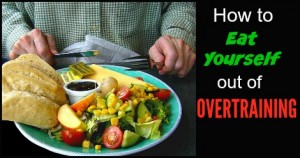Most runners have repeatedly heard that advice that the must drink fluids as the summer months approach or when heat waves strike. Well duh, who doesn’t drink when it’s hot?
Instead of boring you with yet another “news flash” article about how you need to drink more when it’s hot, I’m going delve into some of the specifics of summer hydration – when you should be drinking water versus when you should be drinking sports drinks (or an electrolyte beverage) and how to calculate exactly how much fluid you need on any given training run.
To preface, this article is about hydration and drinking protocols during training, not during a marathon race or while you’re practicing your marathon nutrition strategy. During marathons or fueling for marathon specific long runs, refueling is important and another topic entirely.
Fluid absorption rate
First, it’s important you understand how sugar and electrolytes impact your fluid absorption rates. The speed at which water, electrolytes, and sugars can be absorbed into the blood stream is one of the main determinants of what type of beverage you should choose when trying to stay hydrated.
The absorption of fluids into the body is largely dependent upon two factors: (1) the rate at which it is absorbed through the walls of the small intestine; and (2) the speed at which it is emptied from the stomach. Both of these factors are controlled by the composition of a liquid in terms of its carbohydrate (sugar), and electrolyte concentrations.
As a general rule, the higher the carbohydrate content of your beverage, the slower the absorption rate will be. Consequently, trying to maintain proper hydration and balanced electrolyte levels during a run with sugary sports drinks is difficult. On the other hand, plain water passes through the body too quickly and without providing the necessary sugar to spark the insulin response and ignite the recovery process.
Therefore, your choice for hydration will depend on whether your primary aim is rehydration (keeping the body cool and maintaining fluid balance) or the replenishment of energy (sugar and electrolyte stores).
What is best to drink before and during running
Most sports drinks on the market are what sports scientists call isotonic, which means they contain a carbohydrate solution that is at 6-8% concentration. These drinks are in the middle of the spectrum in terms of absorption rate, with water being the most readily absorbed (hypotonic) and something like fruit juice, being greater than 8% sugar concentration (hypertonic) being the least absorbable. Because the sugar concentration of most sports drinks is higher than that of most body fluid they are not readily absorbed into the blood stream and are thus not optimal for hydration.
Before and during your run, rehydration should be your main priority. When training in warm conditions, rehydration will allow you to maintain fluid balance and stay cool. Accordingly, your best choice before and during your run would be water, a heavily diluted sports beverage, or water with electrolyte tablets.
By drinking water alone, diluting your sports drink, or using electrolyte substitutes, you provide your body with the best combination of electrolyte replacement and immediate absorption. Likewise, electrolytes, especially sodium and potassium, reduce urine output, speed the rate at which fluids empty the stomach, promote absorption from the small intestine, and encourage fluid retention.
Furthermore, not only do you want to shy away from consuming unnecessary amounts of simple sugar when you can avoid it, research shows that when a runner consumes high-glycemic (Gl) foods, like high-sugar sports drinks or energy bars, an hour before a run, he or she may become fatigued more quickly.
What to drink after running
After you are finished working out, water or a diluted sports drink is not the best choice for your recovery needs. Water and diluted drinks do not contain enough of the sugars and electrolytes that your body needs in order to bring itself back into balance.
In addition, because water or highly diluted drinks are rapidly absorbed into the blood stream, consuming high quantities results in a rise in plasma volume (in non technical terms, this means your body is oversaturated with water). This rapid absorption leads to a further imbalance of electrolytes and frequent bathroom stops, which will only increase fluid loss and decrease your desire to drink.
Your best choice post workout is a drink that contains a fair amount of sugars, electrolytes and possibly some protein. Scientific literature has consistently shown that drinking a beverage that contains a 4 to 1 ratio of carbohydrates to protein is optimal for recovery. Therefore, at the very least, you should be drinking a sports drink after you exercise to help ignite the recovery process.
Calculating your sweat loss for optimal hydration
When it comes to losing and rehydrating and replenishing electrolytes every runner is different. Some runners are “salty sweaters” and some people sweat very little. The most efficient way to rehydrate properly is to put back exactly how much fluid you’ve lost while running. This will help you avoid an upset stomach from drinking too much, becoming a victim of hyponatremia, or not drinking enough and becoming dehydrated.
Unfortunately, most generalized advice doesn’t cut it when it comes to how much you need to rehydrate: some say drink to thirst, which may not keep up with your own body’s sweat loss rate if you’re a heavy sweater,; or 8-10oz per hour, which doesn’t factor in temperature, humidity, or environmental factors.
This makes rehydrating properly sound daunting, but calculating your exact fluid loss in any given temperature and humidity is actually quite easy if you use a sweat loss calculator and create a reference chart. All you need to input is your weight before and after each run, any fluid taken or lost through going to the bathroom, and the distance/time you ran. The calculator will do the hard work for you.
RunnersConnect Bonus
Download your FREE Sweat Rate Calculator now.
If you are unsure about how to calculate how much water to consume, and electrolytes to use, this will give you your exact needs.
Use this calculator a few times in different temperatures and record your results. You’ll now have an easy reference chart for exactly how much fluid you need replenish on any given run and in any given temperature. This will help you avoid dehydration, over hydrating, or getting a sloshing stomach this summer.
A version of this post originally appeared at competitor.com







3 Responses
I hve low sodium always craving salt and I drink way to much water hve headaches which gives me nausea which makes me throw up then I’m thirsty so I drink more water. I think I hve an electrolyte imbalance what can I drink besides water ?
Hi Maureen, check out this post here: https://runnersconnect.net/running-nutrition-articles/electrolytes-for-runners/. This should help you with your sodium levels, and give you options other than water.
I would see a doctor Maureen, if you’ve got low Na, you want to know why that is.
Cheers